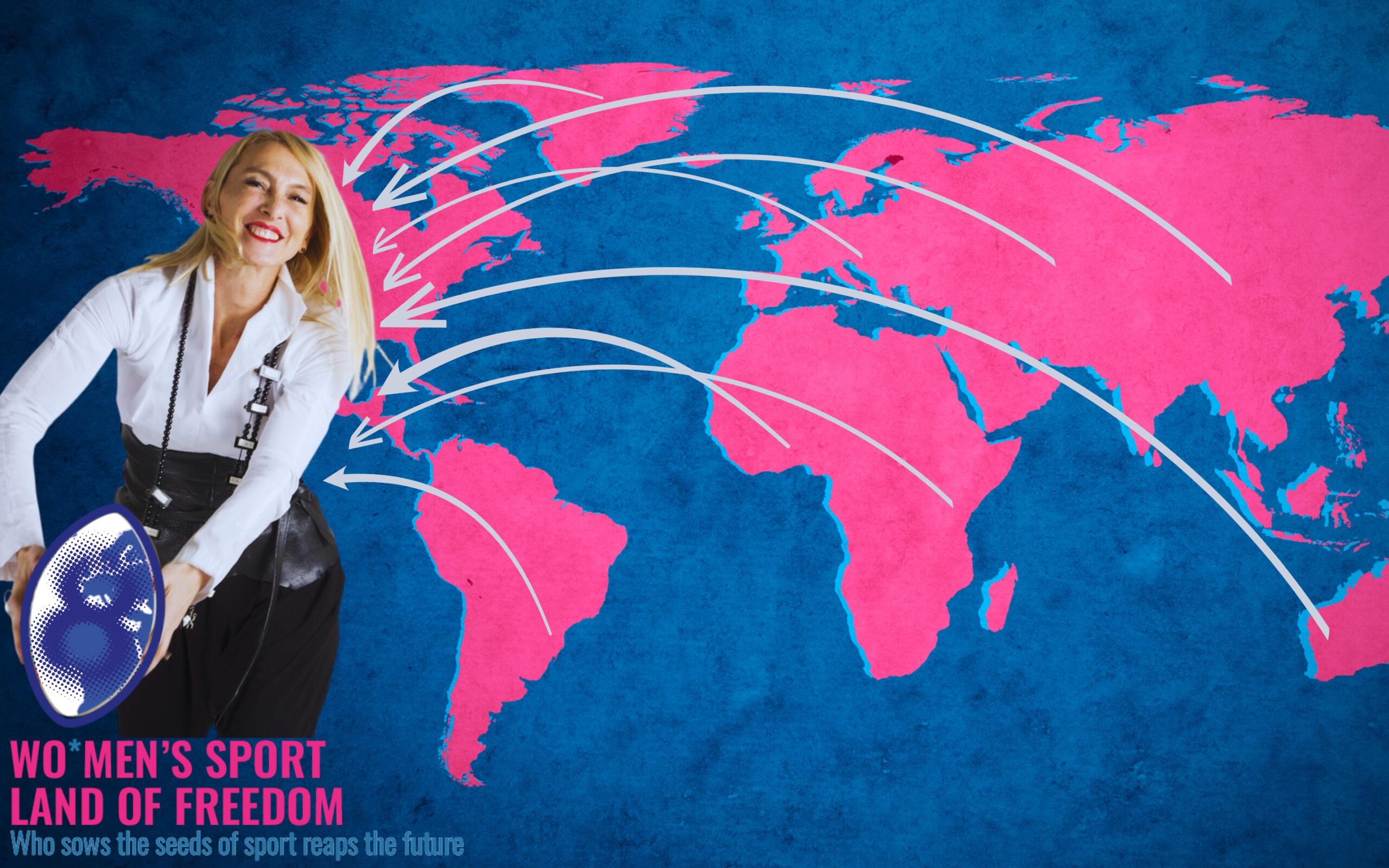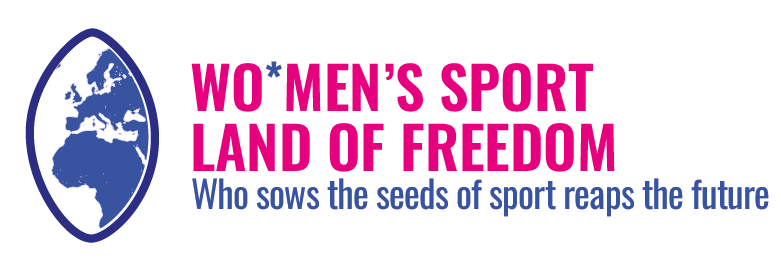
TUNISIA: RUGBY GIVES WOMEN THE RIGHT TO SPEAK, TO LEAD, AND TO BE HEARD — ON AND OFF THE FIELD
“Rugby gives women the right to speak, to lead, and to be heard — on and off the field”

Thanks to:
Maha Zaoui
Rugby Africa General Manager and Union Board member Tunisian federation
- The history of the women’s movement in Tunisia
- Testimonials
- Reading time: 7 minutes
TUNISIA - Find out more
Tunisia is a North African republic with about 12 million inhabitants (2024), a relatively mature demographic structure and a balanced gender distribution. Women currently hold about 15.7% of seats in the national parliament, a sharp drop compared to earlier years of stronger representation. Female labor force participation is very low, at only 26.7%, compared to significantly higher rates for men. Women spend about 21.9% of their time on unpaid domestic work, compared to 2.7% for men. Tunisia is known for its earlier progressive reforms on women’s rights—high female literacy rates, strong presence in universities, and policies such as “vertical parity” on electoral lists. However, in recent years there has been a rollback in political and social achievements, especially after the removal of gender quotas in 2022.
(Source: data.unwomen.org; World Bank Gender Data Portal; IPU Parline; Freedom House; SDG16.plus; Wikipedia – Demographics of Tunisia)
HISTORY OF THE COUNTRY
1. When did the women’s rugby movement start in your country and what is its history? How is rugby structured in your country?
The women’s rugby movement in Tunisia officially began in 2001. It started thanks to a grassroots initiative that brought together young women from different sports backgrounds—particularly athletics, handball, and judo—in a pioneering tournament. This first exposure revealed both the potential and the enthusiasm of girls for rugby, despite it being relatively unknown to women at the time. This marked the beginning of a national commitment to growing the women’s game. The fact that the movement was born independently, before any institutional structures for women’s rugby existed, testifies to the genuine interest and resilience of the first generation of players.
The growth of women’s rugby in Tunisia has been both strategic and symbolic. After the first informal competitions, the sport gained momentum and visibility, leading to the establishment of a national women’s championship in 2003–2004. Over the years, Tunisian women’s rugby has made significant progress in both sevens and fifteens. A key milestone came in the 2023–2024 season with the launch of the first national women’s fifteens championship, marking a strong institutional commitment to diversifying formats and building a high-performance pathway. Internationally, Tunisia’s women’s team has been a continental pioneer. Highlights include: African Sevens Champions (2012) – a prestigious title that placed Tunisia among Africa’s elite. Participation in the 2013 Women’s Rugby World Cup Sevens in Moscow – a rare achievement for a North African nation at the time. Qualification for the Youth Olympic Games in 2014 (Nanjing) and 2018 (Buenos Aires) – showing the depth of youth talent and the country’s ability to integrate rugby into Olympic development pathways. These milestones were not just sporting successes, but tools of national pride and advocacy, helping secure greater investment in women’s sport.
Today, Tunisia has a network of 16 women’s clubs actively involved in training and competitions. These clubs compete in national championships across three formats: sevens, tens, and the newly introduced fifteens. The women’s rugby structure follows a development pyramid that ensures a continuous talent pipeline: annual competitions are organized for U12, U14, U16, U18, and Senior levels. Many clubs partner with schools or universities, integrating rugby into physical education or extracurricular activities. A significant number of players are enrolled in sports schools specializing in the training of future PE teachers and coaches. This integrated structure not only develops athletes but also fuels broader career pathways, creating a complete ecosystem around women’s rugby.
2. Do you think playing rugby has a social impact for a woman in your country?
Without a doubt, rugby has a transformative social impact for women in Tunisia, particularly in working-class or disadvantaged communities. For many girls, rugby is more than a sport: it is a gateway to emancipation, education, and autonomy. Key social impacts include: Personal autonomy: Rugby helps girls build confidence, discipline, and resilience, especially in environments where gender-based limitations persist. / Social mobility: Thanks to rugby, many girls access higher education and professional training. Several players have become PE teachers or coaches, respected roles that offer economic independence. / Family and community acceptance: As women rugby players gain recognition, they often succeed in shifting perceptions within their families and neighborhoods. The sport becomes a symbol of pride and potential, broadening views on what women can achieve. / Collective identity and belonging: Rugby provides a safe and structured community where girls feel supported, listened to, and valued. This social cohesion is vital for mental well-being and long-term commitment.
3. In your opinion, what can rugby give to women in your country?
Rugby can be a powerful engine of holistic development for Tunisian women—on and off the field. It shapes not only strong athletes but also strong citizens. Here’s what rugby offers women in Tunisia: Leadership opportunities: By promoting teamwork, communication, and responsibility, rugby prepares women to lead in sport, schools, workplaces, and communities. / Access to national and international platforms: Rugby opens doors to travel, representing Tunisia at continental and global levels, and engaging with other cultures. / Professional futures in sport: Through coaching, refereeing, team management, and teaching, rugby creates concrete job opportunities and career paths. / A sense of purpose and identity: In a world where girls often struggle to find safe and empowering spaces, rugby provides a place to grow, dream, and belong. / Advocacy and voice: Women shaped by rugby become advocates for gender equity, youth inclusion, and social justice through the game’s values. By investing in women’s rugby, Tunisia invests in a generation of change-makers who can shape not only the future of the sport but also society.
JOURNEYS THROUGH RUGBY
1. When did you start playing rugby and how you discover it?
I was introduced to rugby during my early professional years as a PE instructor in Tunisia, in the early 2000s. At the time, I was teaching sports science, and my fieldwork led me to encounter a new sport that was just beginning to emerge for women in North Africa. I did not grow up playing rugby (my technical sport was swimming), but once I entered the field, I was drawn to its authenticity, intensity, intelligence, and especially its ability to build a strong sense of belonging. I started by learning the rules, observing sessions, and coaching, and soon I actively contributed to structuring and developing the game—especially for women. In a sense, I didn’t just start playing rugby; I joined a movement. My first real exposure came through international tournaments and technical exchanges. What fascinated me was not only the game, but the philosophy behind it: respect, courage, teamwork, and solidarity. These were not just sporting values; they were life values I wanted to instill in others, particularly young women who often lacked structured spaces for expression and ambition.
2. What has rugby taught you that has impacted your daily life? Can you give me an example of when a rugby mindset was useful?
Rugby has taught me to embrace challenges and discomfort as opportunities for growth. Every day, in my role at Rugby Africa, I manage diverse contexts: languages, cultures, political sensitivities, and complex organizational dynamics. Rugby prepared me for this: it taught me to read the field, anticipate contact, protect the ball (your project, your values), and push through resistance. Even more, rugby helped me embody the values I believe in: discipline—because no strategy succeeds without it; teamwork—because no vision is achieved alone; resilience—because setbacks are not the end, they are a new beginning. For example, in 2021 I was tasked with designing and delivering a completely new program for African women sports leaders: the Rugby Africa Sports Management Training Program (RA-SMTP). It was a continental initiative involving Rugby Africa, MEMOS, LUNEX University, and women from over 20 countries. Expectations were high and resources limited. I fully applied the rugby mindset: First: know your team. I identified each participant’s strengths and motivations. Second: build in phases. Like rugby, each stage of the program had a clear goal—content development, online delivery, mentoring, evaluation. Third: adapt under pressure. When we faced technical issues or time-zone conflicts, we kept moving forward together. The result? A program that empowered a generation of women leaders who are now transforming rugby across Africa. For me, that is a winning try.
3. Can you give me 3 words that connect rugby to freedom?
Voice: Rugby gives women the right to speak, lead, and be heard — on and off the field.
Empowerment: It transforms participants into leaders, helping women take control of their paths.
Belonging: In a world that often excludes, rugby says: “You belong here. Come as you are.”
4. What does live in a land of freedom mean to you?
Living in a land of freedom means having choices without fear. It means your gender, background, or origin should never limit your access to education, opportunities, or leadership. It means you can raise your hand in a classroom, your voice in a political meeting, and your flag at a global event — not because you were invited, but because you belong there. For me, freedom is not the absence of obstacles; it is the ability to face them with dignity. It is waking up every morning knowing you are not invisible, that your presence matters. From my journey as a young girl in Tunisia to a continental rugby leader, I have carried this belief like a torch. And now, I do everything I can to pass that flame on to others.
5. What object represents you and why? What is an aphorism that guides your life?
A bridge. Because my entire career has been about connecting people, ideas, and opportunities. I connect cultures—francophone, anglophone, Arab. I connect generations—young girls in rugby boots with senior decision-makers in suits. I connect sectors—education, sport, diplomacy, and development. I don’t just work in rugby; I use rugby to build bridges between what is and what could be. The quote that drives me is: “Be the woman you needed when you were younger.” When I mentor a young woman doubting her place in sport, I remember the girl I once was—curious, ambitious, but unsure of her right to “lead.” Today, I choose to be the mirror that reflects her potential. I design programs, shape policies, and raise my voice, not for personal glory, but so that the next girl won’t have to wonder whether she belongs. Because she already does.
